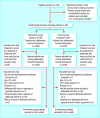General practice based intervention to prevent repeat episodes of deliberate self harm: cluster randomised controlled trial
- PMID: 12028981
- PMCID: PMC113279
- DOI: 10.1136/bmj.324.7348.1254
General practice based intervention to prevent repeat episodes of deliberate self harm: cluster randomised controlled trial
Abstract
Objectives: To evaluate the impact of an intervention based in general practice on the incidence of repeat episodes of deliberate self harm.
Design: Cluster randomised controlled trial in which 98 general practices were assigned in equal numbers to an intervention or a control group. The intervention comprised a letter from the general practitioner inviting the patient to consult, and guidelines on assessment and management of deliberate self harm for the general practitioner to use in consultations. Control patients received usual general practitioner care.
Setting: General practices within Avon, Wiltshire, and Somerset Health Authorities, whose patients lived within the catchment area of four general hospitals in Bristol and Bath.
Participants: 1932 patients registered with the study practices who had attended accident and emergency departments at one of the four hospitals after an episode of deliberate self harm.
Main outcome measures: Primary outcome was occurrence of a repeat episode of deliberate self harm in the 12 months after the index episode. Secondary outcomes were number of repeat episodes and time to first repeat.
Results: The incidence of repeat episodes of deliberate self harm was not significantly different for patients in the intervention group compared with the control group (odds ratio 1.2, 95% confidence interval 0.9 to 1.5). Similar findings were obtained for the number of repeat episodes and time to first repeat. Subgroup analyses indicated that there was no differential effect of the intervention according to patient's sex (P=0.51) or method used to cause deliberate self harm (P=0.64). The treatment seemed to be beneficial for people with a history of deliberate self harm, but it was associated with an adverse effect in people for whom the index episode was their first episode (interaction P=0.017).
Conclusions: An invitation to consult, sent by the general practitioner of patients who have deliberately harmed themselves, and the use of management guidelines during any subsequent consultation did not reduce the incidence of repeat self harm. A subgroup analysis that indicated that patients who had previously harmed themselves benefited from the intervention was inconsistent with previous evidence and should be treated with caution. More research is needed on how to manage patients who deliberately harm themselves, to reduce the incidence of repeat episodes.
Figures
Comment in
-
General practice based interventions to prevent repeat episodes of deliberate self harm. GPs have to manage this problem.BMJ. 2002 Aug 3;325(7358):281. BMJ. 2002. PMID: 12153933 Free PMC article. No abstract available.
-
General practice based interventions to prevent repeat episodes of deliberate self harm. Pictures of self injury misrepresent published trial.BMJ. 2002 Aug 3;325(7358):281. BMJ. 2002. PMID: 12162305 No abstract available.
-
Self harm was misrepresented (again).BMJ. 2005 Apr 30;330(7498):1026. doi: 10.1136/bmj.330.7498.1026. BMJ. 2005. PMID: 15860841 Free PMC article. No abstract available.
References
-
- Hawton K, Fagg J, Simkin S, Bale E, Bond A. Trends in deliberate self-harm in Oxford, 1985-1995. Implications for clinical services and the prevention of suicide. Br J Psychiatry. 1997;171:556–560. - PubMed
-
- Hawton K, Harriss L, Simkin S, Bale E, Bond A. Deliberate self-harm in Oxford. Oxford: University of Oxford; 1999. - PubMed
-
- Van der Sande R, Van Rooijen L, Buskens E, Allart E, Hawton K, Van der Graaf Y, et al. Intensive in-patient and community intervention versus routine care after attempted suicide: a randomised controlled intervention study. Br J Psychiatry. 1997;171:35–41. - PubMed
Publication types
MeSH terms
LinkOut - more resources
Full Text Sources
Medical



